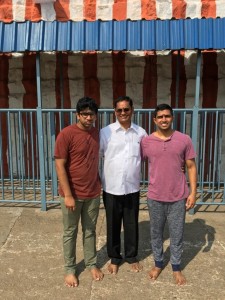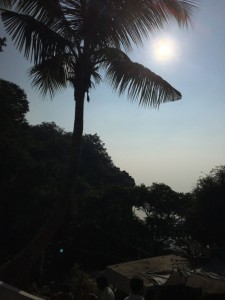By: Sagar Dommaraju
Illinois summers are hot—but they’re nothing compared to the ones I experience when I visit relatives in southern India. Temperatures there easily top 100 degrees, cooling rains rarely fall, and—if you live in a rural village—air conditioning is unavailable at certain peak electricity times. But those stifling summers have taught me different ways to stay cool, and the following tips are just as useful at reducing air conditioning costs in Illinois.
First, eliminate unnecessary sources of heat.
-

Wearing long pants is a cultural norm-even in the heat! (That’s me on the right with my uncle and brother.)
Delay heat-producing tasks, such as dishwashing, baking, or laundry until the evening or early morning hours. (My aunt in India would gt up at sunrise to make dishes for breakfast and lunch, and then wouldn’t touch the stove again until sundown.)
- Make sure that the windows and doors are closed and sealed in the house during the midday, so hot air can’t seep in. If temperatures lower during the evening, turn off your AC and open windows on opposite sides to let a nice breeze cool your home.
- Shut blinds during daytime hours. Unrelenting sunlight is to blame for unbearably hot homes in India.
- Do not place lamps, TVs, or other hot electronics close to a thermostat; they can trick your unit into thinking the room is warmer than it actually is.
- Use a bath fan to remove heat and moisture from the bathroom and use an exhaust fan to remove heat while you cook.
Second, don’t overwork your AC.
-

In the afternoon, workers would leave our mango farm to rest in the shade.
Fans are a great supplement—but not a replacement—for air conditioning. If you raise your thermostat by only 2 degrees and use a ceiling fan, you can cut costs by 14 percent. Ceiling fans should rotate counter-clockwise (from your position looking up at it) to create a down-draft. Cool off even more by spraying yourself with water—something I did all the time in India.
- Clean your unit’s filters at least once every three months. Proper maintenance can improve its performance and save energy in the long run.
Third, pay attention to how you feel.
-

The heat is especially dangerous for pilgrims climbing six miles uphill to reach a temple in Tirumala.
Do not raise your thermostat too high just to cut costs. Utilities often recommend setting it between 74-78 degrees when you’re at home during the summer. Excessive temperatures in homes can lead to dehydration, heat exhaustion, fainting, and even heat stroke in extreme cases.
- Drink plenty of water. A person should drink 6-8 cups of water a day—based on age, body weight, physical activity, etc. Hydrated individuals are much better equipped to deal with warm temperatures.
- Go somewhere that has air-conditioning during the hottest hours of the afternoon. Movie theaters, shopping malls, public libraries, and the homes of friends and family can all be cool places of refuge.
Let us know your tips for staying cool without breaking the bank. Also, check out summer efficiency programs by visiting CUB’s energy efficiency page.
Sagar Dommaraju, a summer intern for CUB’s Communications Department, graduated from the University of Illinois at Chicago this spring with a bachelor’s degree in mathematics. He wishes to enter medical school to pursue his dream of becoming a physician. Meanwhile, he is excited to work with CUB and fight on behalf of Illinois utility consumers!

